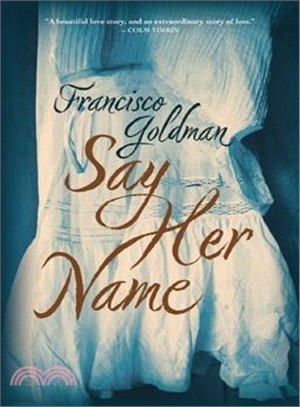Say Her Name ─ A Novel
商品資訊
ISBN13:9780802119810
出版社:Grove Pr
作者:Francisco Goldman
出版日:2011/04/05
裝訂/頁數:精裝/288頁
規格:24.1cm*16.5cm*3.2cm (高/寬/厚)
商品簡介
作者簡介
相關商品
商品簡介
In 2007, while attempting to bodysurf off the coast of Mexico, Francisco Goldman’s wife, Aura, was killed by a rogue wave. They’d been married for just under two years, but anyone who ever met them couldn’t deny how they seemed made for each other, even despite their 20-year age difference. Devastated and lost, the only thing that shocks Frank out of his heartbroken haze is the allegation Aura’s mother brings against him: Frank is the one responsible for Aura’s death and will be held legally accountable. Rudderless and half-mad with grief, he begins to contemplate his mother-in-law’s words, determined to trace Aura’s tragic destiny back to its source. Say Her Name is Frank’s fictional account of his relationship with Aura, of her past, and of his struggle to be reborn in a world without her.
Frank stands in awe of his grief: what to do with Aura’s clothes; how will he support himself now that her savings were used on the funeral etc. and he’s too crushed to keep his teaching job; can he stop the nightmares and persistent visions of Aura that cloud his mind; what does it really mean that he fell into bed with one of her friends soon after her death; how long should he leave up the altar Aura’s friends built in his living room; and did his most lasting subsequent relationship, which began over a year after Aura’s death with a waitress Aura once helped with schoolwork, truly fail because no one will ever compare to his one true love? It’s hard for him to even care when he’s struck by a car on the first New Year’s Eve without Aura and is nearly killed. His first wife, Augusta, must come and force him to snap out of it. Though he takes some solace in the support of Aura’s cousin, Fabiola, who along with her mother loves and trusts Frank despite her aunt’s protestations and who pointedly defended and supported him after Aura passed, Frank is rooted to his pain.
He begins gathering her diary entriesoften self-doubting, witty, intensely personal, and vibrating with passionate creativityand snippets of novels and essays she was writing for her phD classes at Columbia and the MFA creative writing program at City College, trying to fill in the blanks about her life, fears, and ambitions. He reflects on their meeting years before, after a lecture at NYU, how he was immediately smitten and how the two spent the night feverishly absorbed in conversation even though Aura was with another man, and still wound up leaving with that man. It takes a year for them to meet up again, randomly in Mexico, Aura’s homeland and a country Frank had become enamored with after frequent journalism trips earlier in his life. Both are bound for NY again and promise to meet up once they arrive and settle back in. After some hesitation on Aura’s part, afraid Frank won’t agree to lunch with her simply because he’s interested in sex, a fight with her roommates pushes her into his arms and there she stays.
It takes just 6 weeks for Aura to move in with Frank, despite her mother’s concerns. Frank will only meet Juanita a handful of times over the course of their relationship, and every time she seems more hostile. She doesn’t like the age difference, she doesn’t trust him, she’s afraid he can’t support her daughter well enough, and she attempts to turn Aura against Frank countless times. Though Aura’s devotion to her mother is boundless, so is her love for Frank, and despite all her mother’s done to raise herworked multiple jobs, bartered in the worst kind of ways, and ultimately let her come to Americashe chooses to stay with Frank. And that simple decision, he fears, despite all the joy it offered, may have cost her her life.
After all, their marriage almost didn’t happen. They’d waited too long to secure a priest and barely find one in the nick of time, and Frank leaves his passport at home as he’s rushing to get the marriage license. Aura frantically looks around their Mexico apartment, knowing full well they need the license before the office closes for the day if they’re to be married on time and that Frank won’t be able to obtain it without his ID. Again they succeed, but only just. While one could say that these were perhaps signs” proving how they’re meant for each otherthe universe ganging up to do everything to keep them apart and still they overcome the odds, Frank again is tortured with the idea that he sealed her fate as he sealed their vows.
Two years later they return to the very coast where Frank proposed. Though surrounded by dangerous beaches, no one considers Mazunte to be hazardous. Certainly Frank and Aura have never known of any tragic accidents on its shore. It was their annual summer trip back to Mexico, and they were about a month delayed because Aura decided to teach Spanish classes at Columbia. By the time they arrive to Port Escondido, bad weather is moving in and they’re worried they won’t have time at the beach in Mazunte. They decide to go early. Aura never liked the ocean; the waves frightened her and Frank always had to guide her out and stay close by. But that day something came over Aura. She’d been watching Frank try and bodysurf and she felt compelled to prove that she could try it. He warned her to keep her neck up at all times and watched her try and catch a wave. When the wave passed, she was nowhere. He called, and then he saw her body on the shore, face down. She was conscious but couldn’t move; her neck was broken. She cried for air. They find a doctor, but no ambulance can respond. The restaurant will not let them use their phone to call 911. A stranger helps load Aura onto a surfboard and offers his SUV. They drive to the nearest hospital, but it’s not equipped to handle her condition. She must be airlifted to a city hospital immediately, but again it takes too long to find an ambulance that can bring them to the airport. When they finally do, the airport is closed and the air ambulance cannot land. But Aura’s cousin had managed to get a Red Cross heli to come too, and that one arrives, even if it doesn’t have the automated ventilator she needs to stay alive. The doctor who helped on the beach offers to accompany them with a manual ventilator. They reach the hospital, but there’s nothing they can do. Aura’s spirits remain high with Frank, but he later discovers that her former stepfather heard her say she didn’t want to die. The next morning she slips into a coma and then slips away.
Another two years would pass before Frank can give his testimonial of what happened that day. He’d tried when it happened, but after sharing his version of events, he was told it could not be accepted because he didn’t have ID. Juanita had always found his refusal to tell his story suspicious, and felt that he was trying to keep her from being able to lay her daughter to rest by keeping the case open. But Juanita was the one who took Aura’s ashes and kept them from Frank, did who knows what with his love’s remains, and evicted him from their Mexico apartment, which she owned, just a couple months after the death. Aura died not knowing the truth about her mother, but Frank uncovered it for her. She always thought her father abandoned them, but after Aura’s death, spurred by the conviction that finding the truth himself, even then, would give Aura peace, he meets up with her father. Aura had only seen him twice since he disappeared from her life when she was four and was never able to get answers. When Frank confronts him though, he’s so defeated by Aura’s death that he reveals he never left them. Juanita fell for another man who she thought could give them a better life. She took off with Aura one afternoon and drove to Mexico City. When her new man leaves her a few months later, she comes crawling back but by then Aura’s father had ripped them from his heart and couldn’t forgive. When Juanita married Rodrigo, he felt that Aura should only have one father and backed away for good. Little did he know that Rodrigo was often violent with Aura and never gave her the father’s love she deserved, something Frank easily related to, having had an emotionally and physically abusive father himself. But not even this knowledge, nor the act of telling his story, years later, shaped and redefined by his shifting memories, by his rage and hopelessness, his new experiences and small joys, can bring rebirth. In the end, Frank realizes that the loose ends can bring comfort instead of pain, that he cannot end her story but is meant to pick up where she left off and write it for her.
From Frank:
Roberto Calasso, the Italian writer and editorial director of the Adelphi publishing house, wrote an essay in which he described the founding of Adelphi’s libro unico” line of books. How to translate libro unico” into English -- unique book, singular book? Neither is quite right. What is a libro unico?” Calasso asked in his essay. Definitely: a libro unico is one in which it is immediately noted that something has happened to the author, and he has ended up depositing that something in a written text.”
I think that definition more accurately defines Say Her Name than the word memoir” does. It’s also a better definition than just prose work,” or merely book.” I chose novel” a capacious term because it is a novel, and not only because in crucial aspects I’ve fictionalized.” But it also meets Calasso’s definition of a libro unico because the something that I’ve deposited here is my wife Aura Estrada’s death. Her death, her life, and what happened after her death.
As the reader can see, I’ve relied quite a bit on Aura’s own writings, her own fiction and essays, some of these published, and on her diaries. But I’ve surrounded her and myself with a fictionalized family and many friends, not in order to fabricate even to exaggerate anyone’s bad or hurtful behavior or character, for example, but to protect, and to keep secrets, including our own secrets, while giving myself the chance to write a truer account of our lives Aura’s and my own, with and without her than a non-fictional strictly factual would have.
Frank stands in awe of his grief: what to do with Aura’s clothes; how will he support himself now that her savings were used on the funeral etc. and he’s too crushed to keep his teaching job; can he stop the nightmares and persistent visions of Aura that cloud his mind; what does it really mean that he fell into bed with one of her friends soon after her death; how long should he leave up the altar Aura’s friends built in his living room; and did his most lasting subsequent relationship, which began over a year after Aura’s death with a waitress Aura once helped with schoolwork, truly fail because no one will ever compare to his one true love? It’s hard for him to even care when he’s struck by a car on the first New Year’s Eve without Aura and is nearly killed. His first wife, Augusta, must come and force him to snap out of it. Though he takes some solace in the support of Aura’s cousin, Fabiola, who along with her mother loves and trusts Frank despite her aunt’s protestations and who pointedly defended and supported him after Aura passed, Frank is rooted to his pain.
He begins gathering her diary entriesoften self-doubting, witty, intensely personal, and vibrating with passionate creativityand snippets of novels and essays she was writing for her phD classes at Columbia and the MFA creative writing program at City College, trying to fill in the blanks about her life, fears, and ambitions. He reflects on their meeting years before, after a lecture at NYU, how he was immediately smitten and how the two spent the night feverishly absorbed in conversation even though Aura was with another man, and still wound up leaving with that man. It takes a year for them to meet up again, randomly in Mexico, Aura’s homeland and a country Frank had become enamored with after frequent journalism trips earlier in his life. Both are bound for NY again and promise to meet up once they arrive and settle back in. After some hesitation on Aura’s part, afraid Frank won’t agree to lunch with her simply because he’s interested in sex, a fight with her roommates pushes her into his arms and there she stays.
It takes just 6 weeks for Aura to move in with Frank, despite her mother’s concerns. Frank will only meet Juanita a handful of times over the course of their relationship, and every time she seems more hostile. She doesn’t like the age difference, she doesn’t trust him, she’s afraid he can’t support her daughter well enough, and she attempts to turn Aura against Frank countless times. Though Aura’s devotion to her mother is boundless, so is her love for Frank, and despite all her mother’s done to raise herworked multiple jobs, bartered in the worst kind of ways, and ultimately let her come to Americashe chooses to stay with Frank. And that simple decision, he fears, despite all the joy it offered, may have cost her her life.
After all, their marriage almost didn’t happen. They’d waited too long to secure a priest and barely find one in the nick of time, and Frank leaves his passport at home as he’s rushing to get the marriage license. Aura frantically looks around their Mexico apartment, knowing full well they need the license before the office closes for the day if they’re to be married on time and that Frank won’t be able to obtain it without his ID. Again they succeed, but only just. While one could say that these were perhaps signs” proving how they’re meant for each otherthe universe ganging up to do everything to keep them apart and still they overcome the odds, Frank again is tortured with the idea that he sealed her fate as he sealed their vows.
Two years later they return to the very coast where Frank proposed. Though surrounded by dangerous beaches, no one considers Mazunte to be hazardous. Certainly Frank and Aura have never known of any tragic accidents on its shore. It was their annual summer trip back to Mexico, and they were about a month delayed because Aura decided to teach Spanish classes at Columbia. By the time they arrive to Port Escondido, bad weather is moving in and they’re worried they won’t have time at the beach in Mazunte. They decide to go early. Aura never liked the ocean; the waves frightened her and Frank always had to guide her out and stay close by. But that day something came over Aura. She’d been watching Frank try and bodysurf and she felt compelled to prove that she could try it. He warned her to keep her neck up at all times and watched her try and catch a wave. When the wave passed, she was nowhere. He called, and then he saw her body on the shore, face down. She was conscious but couldn’t move; her neck was broken. She cried for air. They find a doctor, but no ambulance can respond. The restaurant will not let them use their phone to call 911. A stranger helps load Aura onto a surfboard and offers his SUV. They drive to the nearest hospital, but it’s not equipped to handle her condition. She must be airlifted to a city hospital immediately, but again it takes too long to find an ambulance that can bring them to the airport. When they finally do, the airport is closed and the air ambulance cannot land. But Aura’s cousin had managed to get a Red Cross heli to come too, and that one arrives, even if it doesn’t have the automated ventilator she needs to stay alive. The doctor who helped on the beach offers to accompany them with a manual ventilator. They reach the hospital, but there’s nothing they can do. Aura’s spirits remain high with Frank, but he later discovers that her former stepfather heard her say she didn’t want to die. The next morning she slips into a coma and then slips away.
Another two years would pass before Frank can give his testimonial of what happened that day. He’d tried when it happened, but after sharing his version of events, he was told it could not be accepted because he didn’t have ID. Juanita had always found his refusal to tell his story suspicious, and felt that he was trying to keep her from being able to lay her daughter to rest by keeping the case open. But Juanita was the one who took Aura’s ashes and kept them from Frank, did who knows what with his love’s remains, and evicted him from their Mexico apartment, which she owned, just a couple months after the death. Aura died not knowing the truth about her mother, but Frank uncovered it for her. She always thought her father abandoned them, but after Aura’s death, spurred by the conviction that finding the truth himself, even then, would give Aura peace, he meets up with her father. Aura had only seen him twice since he disappeared from her life when she was four and was never able to get answers. When Frank confronts him though, he’s so defeated by Aura’s death that he reveals he never left them. Juanita fell for another man who she thought could give them a better life. She took off with Aura one afternoon and drove to Mexico City. When her new man leaves her a few months later, she comes crawling back but by then Aura’s father had ripped them from his heart and couldn’t forgive. When Juanita married Rodrigo, he felt that Aura should only have one father and backed away for good. Little did he know that Rodrigo was often violent with Aura and never gave her the father’s love she deserved, something Frank easily related to, having had an emotionally and physically abusive father himself. But not even this knowledge, nor the act of telling his story, years later, shaped and redefined by his shifting memories, by his rage and hopelessness, his new experiences and small joys, can bring rebirth. In the end, Frank realizes that the loose ends can bring comfort instead of pain, that he cannot end her story but is meant to pick up where she left off and write it for her.
From Frank:
Roberto Calasso, the Italian writer and editorial director of the Adelphi publishing house, wrote an essay in which he described the founding of Adelphi’s libro unico” line of books. How to translate libro unico” into English -- unique book, singular book? Neither is quite right. What is a libro unico?” Calasso asked in his essay. Definitely: a libro unico is one in which it is immediately noted that something has happened to the author, and he has ended up depositing that something in a written text.”
I think that definition more accurately defines Say Her Name than the word memoir” does. It’s also a better definition than just prose work,” or merely book.” I chose novel” a capacious term because it is a novel, and not only because in crucial aspects I’ve fictionalized.” But it also meets Calasso’s definition of a libro unico because the something that I’ve deposited here is my wife Aura Estrada’s death. Her death, her life, and what happened after her death.
As the reader can see, I’ve relied quite a bit on Aura’s own writings, her own fiction and essays, some of these published, and on her diaries. But I’ve surrounded her and myself with a fictionalized family and many friends, not in order to fabricate even to exaggerate anyone’s bad or hurtful behavior or character, for example, but to protect, and to keep secrets, including our own secrets, while giving myself the chance to write a truer account of our lives Aura’s and my own, with and without her than a non-fictional strictly factual would have.
作者簡介
FRANCISCO GOLDMAN is the author of three novels: The Long Night of White Chickens, which won the Sue Kaufman Prize for First Fiction and was a finalist for the PEN/Faulkner Award; The Ordinary Seaman, a finalist for the International IMPAC Dublin Literary Award and The Los Angeles Times Book Prize; and The Divine Husband. Goldman is also the author of the non-fiction book, The Art of Political Murder: Who killed the Bishop?, which was named a Best Book of the Year by The Chicago Tribune, The Washington Post, The San Francisco Chronicle, and The Economist. Goldman has been a contributing editor for Harper’s magazine, and his fiction, journalism and essays have appeared in publications such as The New Yorker, The New York Review of Books, Esquire and The New York Times Magazine. He is the recipient of a Guggenheim Foundation grant and the T. R. Fyvel Freedom of Expression Book Award, and was a fellow at the American Academy of Berlin and the Center for Scholars and Writers at the New York Public Library. He currently directs the Premio Aura Estrada/Aura Estrada Prize (www.premioauraestrada.com). Goldman divides his time between Brooklyn and Mexico City.
主題書展
更多
主題書展
更多書展今日66折
您曾經瀏覽過的商品
購物須知
外文書商品之書封,為出版社提供之樣本。實際出貨商品,以出版社所提供之現有版本為主。部份書籍,因出版社供應狀況特殊,匯率將依實際狀況做調整。
無庫存之商品,在您完成訂單程序之後,將以空運的方式為你下單調貨。為了縮短等待的時間,建議您將外文書與其他商品分開下單,以獲得最快的取貨速度,平均調貨時間為1~2個月。
為了保護您的權益,「三民網路書店」提供會員七日商品鑑賞期(收到商品為起始日)。
若要辦理退貨,請在商品鑑賞期內寄回,且商品必須是全新狀態與完整包裝(商品、附件、發票、隨貨贈品等)否則恕不接受退貨。
























